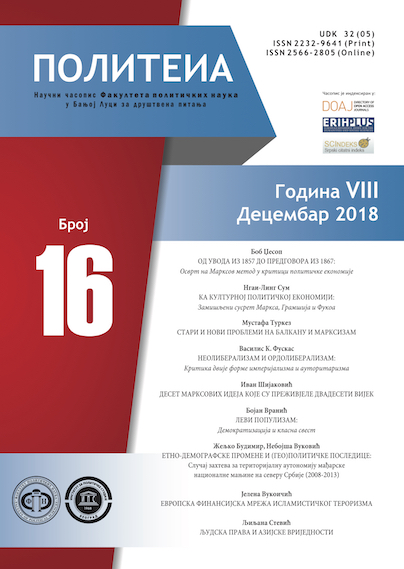POPULISM TO THE LEFT: Democratisation and class consciousness
Abstract
This paper analyses the possibility of left populism to trigger class consciousness with what Laclau calls populist subjects. The author argues that populist subjects and class consciousness are not identical nor interchangeable concepts in respect to the classical Marx and Engels notion on the proletarian class. In the first part of the paper, the author sets a description of populism based on its three key features: reaction, the notion of the people, and the struggle. In the second part, the idea of class consciousness is analysed, showing that class consciousness is necessarily political. In the third part of the paper, the idea of left populism is explored by using the findings of the second part of the paper, showing structural inconsistencies in the idea of the populist subject.
References
Arditi, B. (2007). Politics on the Edges of Liberalism. Edinburg: Edinburg University Press.
Arditi, B. (2005). Populism as an Internal Periphery of Democratic Politics. In: F. Panizza (ed.), Populism and the Mirror of Democracy (72 – 98). London: Verso.
Cammack, P. (2000). The Resurgence of Populism in Latin America. Bulletin of Latin American Research, Vol. 19, No. 2: 149 – 161.
Canovan, M. (2002). Taking Politics to the People: Populism as the Ideology of Democracy. In: Y. Mény & Y. Surel (eds.), Democracies and the Populist Challenge (25 – 44). London: Palgrave.
DW. (2018). Alternativa prvi put druga, https://www.dw.com/sr/alternativa-prvi-put-druga/a-45590202. Last accessed: December 13, 2018.
Finchelstein, F. (2017). From Fascism to Populism in History. Oakland: University of California Press.
Laclau, E. (2005). Populism: What’s in a Name? In: F. Panizza (ed.), Populism and the Mirror of Democracy (32 – 49). London: Verso.
Marx, K. (1904). A Contribution to the Critique of Political Economy. Chicago: Charles H. Kerr & Company.
Marx, K., & Engels, F. (1948). The Communist Manifesto. New York: International Publishers.
Marx, K. & Engels, F. (1974). The German Ideology: Part One. London: Lawrence & Wishart.
Mouffe, C. (2005). The “End of Politics” and the Challenge of Right-Wing Populism. In: F. Panizza (ed.), Populism and the Mirror of Democracy (50 – 71). London: Verso.
Mouffe, C. (2018). For a Left Populism. Verso: London.
Mudde, C. (2005). Populist Radical Right in Europe. Cambridge: Cambridge University Press.
Mudde, C. & Kaltwasser, C. R. (2017). Populism: A Very Short Introduction. Oxford: Oxford University Press.
Müller, J.-W. (2015). Parsing Populism. Juncture, 22(2): 80-89.
Panizza, F. (2005). Introduction: Populism and the Mirror of Democracy. In: F. Panizza (ed.), Populism and the Mirror of Democracy (1 – 33). London: Verso.
Sum, N-L. & Jessop, B. (2013). Towards a Cultural Economy: Putting Culture in its Place in Political Economy. Cheltenham: Edward Elgar.
Taggart, P. (2000). Populism. Philadelphia: Open University Press.
Autori koji objavljuju u ovom časopisu pristaju na sljedeće uslove:
- Autori zadržavaju autorska prava i pružaju časopisu pravo prvog objavljivanja rada i licenciraju ga "Creative Commons Attribution licencom" koja omogućava drugima da dijele rad, uz uslov navođenja autorstva i izvornog objavljivanja u ovom časopisu.
- Autori mogu izraditi zasebne, ugovorne aranžmane za neekskluzivnu distribuciju članka objavljenog u časopisu (npr. postavljanje u institucionalni repozitorijum ili objavljivanje u knjizi), uz navođenje da je članak izvorno objavljen u ovom časopisu.
- Autorima je dozvoljeno i podstiču se da postave objavljeni članak onlajn (npr. u institucionalni repozitorijum ili na svoju internet stranicu) prije ili tokom postupka prijave rukopisa, s obzirom da takav postupak može voditi produktivnoj razmjeni ideja i ranijoj i većoj citiranosti objavljenog članka (Vidi Efekti otvorenog pristupa).

